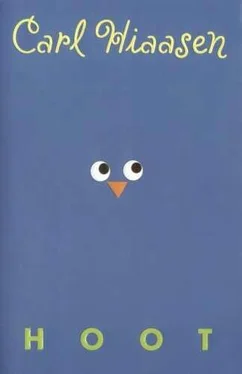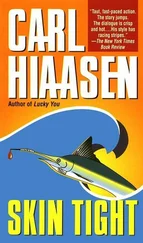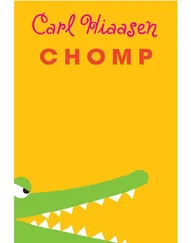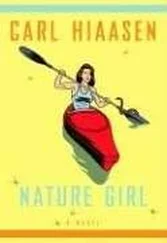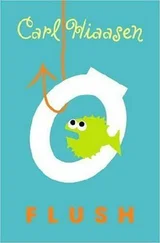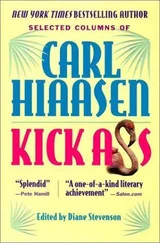His mother said, "The phone started ringing at six this morning. Your dad made me take it off the hook."
"I'm really sorry, Mom."
"Don't be silly. I'm making a whole scrapbook, honey, something to show your children and grandchildren."
I'd rather show them the owls, Roy thought, if there are any left by then.
"Roy!"
It was his father, calling to him from the den. "Could you please get the door?"
A thin young woman with short-cropped black hair greeted Roy on the front steps. She was armed with a spiral notebook and a ballpoint pen.
"Hi, I'm from the Gazette," she announced.
"Thanks, but we've already got a subscription."
The woman laughed. "Oh, I don't sell the newspaper. I write it." She extended a hand. "Kelly Colfax."
On her neck Roy noticed several bluish, finger-sized marks that resembled the bruises that Dana Matherson had left on him. Roy figured that Kelly Colfax was the reporter whom Chuck Muckle had tried to choke.
"I'll go get my father," he said.
"Oh, that's not necessary. It's you I wanted to speak with," she said. "You are Roy Eberhardt, right?"
Roy felt trapped. He didn't want to act rude, but he certainly didn't want to say anything that might cause more trouble for Mullet Fingers.
Kelly Colfax began firing questions:
"How'd you get involved in the demonstration?"
"Are you friends with Napoleon Bridger Leep?"
"Were you two involved in the vandalism incidents on the Mother Paula's property?"
"Do you like pancakes? What kind of pancakes?"
Roy's head was whirling. Finally he broke in and said, "Look, I just went there to stand up for the owls. That's all."
As the reporter jotted down Roy's words, the door swung open, and there stood Mr. Eberhardt-shaved, showered, and neatly dressed in one of his gray suits.
"Excuse me, ma'am, may I have a word with my son?"
"Absolutely," said Kelly Colfax.
Mr. Eberhardt brought Roy inside and closed the door. "Roy, you don't have to answer any of her questions."
"But I just want her to know-"
"Here. Give her this." Roy's father clicked open his briefcase and removed a thick manila folder.
"What is it, Dad?"
"She'll figure it out."
Roy opened the folder and broke into a grin. "This is the file from City Hall, isn't it?"
"A copy," said his father. "That's correct."
"The one with all Mother Paula's stuff. I tried to find it, but it wasn't there," Roy said. "Now I know why."
Mr. Eberhardt explained that he had borrowed the file, xeroxed every page, and then taken the material to some lawyers who were experts on environmental matters.
"So does Mother Paula's have permission to bury the owl dens or not?" Roy asked. "Was it in the file?"
His father shook his head. "Nope."
Roy was exultant but also puzzled. "Dad, shouldn't you be giving this to somebody at the Justice Department? Why do you want me to hand it over to the newspaper?"
"Because there's something there that everybody in Coconut Cove ought to know." Mr. Eberhardt spoke in a hushed and confidential tone. "Actually, it's what isn't there that's important."
"Tell me," Roy said, and his father did.
When Roy opened the front door again, Kelly Colfax was waiting with a perky smile. "Can we continue our interview?"
Roy smiled brightly in return. "Sorry, but I'm running real late for school." He held out the file. "Here. This might help with your story."
The reporter tucked her notebook under one arm and snatched the folder from Roy's hands. As she thumbed through the documents, the elation on her face dissolved into frustration.
"What does all this stuff mean, Roy? What exactly am I looking for?"
"I think it's called an E.I.S.," Roy said, reciting what his father had told him.
"Which stands for…?"
"Environmental Impact Statement."
"Right! Of course," the reporter said. "Every big construction project is supposed to do one. That's the law."
"Yeah, but Mother Paula's E.I.S. isn't in there."
"You're losing me, Roy."
"It's supposed to be in that file," he said, "but it's not. That means the company never did one-or they lost it on purpose."
"Ah!" Kelly Colfax looked as if she'd just won the lottery. "Thank you, Roy," she said, embracing the folder with both arms as she backed down the steps. "Thank you very, very much."
"Don't thank me," Roy said under his breath. "Thank my dad." Who obviously cared about the owls, too.
During the following weeks, the Mother Paula's story mushroomed into a full-blown scandal. The missing Environmental Impact Statement made the front page of the Gazette and ultimately proved to be the fatal blow to the pancake-house project.
It turned out that a thorough E.I.S. had been completed, and that the company's biologists had documented three mated pairs of burrowing owls living on the property. In Florida the birds were strictly protected as a Species of Special Concern, so their presence on the Mother Paula's site would have created serious legal problems-and a public-relations disaster-if it had become widely known.
Consequently, the Environmental Impact Statement conveniently disappeared from the city files. The report later turned up in a golf bag owned by Councilman Bruce Grandy, along with an envelope containing approximately $4,500 in cash. Councilman Grandy indignantly denied that the money was a bribe from the pancake people; then he rushed out and hired the most expensive defense lawyer in Fort Myers.
Meanwhile, Kimberly Lou Dixon quit her TV role as Mother Paula, declaring she couldn't work for a company that would bury baby owls just to sell a few flapjacks. The climax of her tearful announcement came when she displayed her life membership card from the Audubon Society-a moment captured by Entertainment Tonight, Inside Hollywood, and People magazine, which also published the picture of Kimberly Lou, Roy, and Beatrice hand-in-hand at the owl protest.
It was more media attention than Kimberly Lou Dixon had received as the Miss America runner-up, or even as the future star of Mutant Invaders from Jupiter Seven. Roy's mother kept track of the actress's soaring career in the show business columns, where it was reported that she'd signed a deal to appear in the next Adam Sandler movie.
By contrast, the owl publicity was a nightmare for Mother Paula's All-American Pancake Houses, Inc., which found itself the subject of an unflattering frontpage article in the Wall Street Journal. Immediately, the price of the company's stock began sinking like a stone.
After going wacko at the groundbreaking ceremony, Chuck E. Muckle got demoted to the post of assistant junior vice-president. Although he did not go to jail for choking the newspaper reporter, he was forced to take a class called "How to Manage Your Anger," which he failed. Soon afterward, he resigned from the pancake company and took a job as a cruise director in Miami.
In the end, Mother Paula's had no choice but to abandon its plan to put a restaurant on the corner of East Oriole and Woodbury. There were the nagging headlines about the missing E.I.S., the embarrassing resignation of Kimberly Lou Dixon, the TV footage of Chuck Muckle throttling Kelly Colfax… and, last but not least, those darn owls.
Everybody was upset about the owls.
NBC and CBS sent film crews to Trace Middle School to meet with the student protesters, as well as with faculty members. Roy lay low, but he later heard from Garrett that Miss Hennepin had given an interview in which she praised the kids who took part in the lunchtime protest and claimed she'd encouraged them to participate. Roy was always amused when grownups lied to make themselves look more important.
Читать дальше
